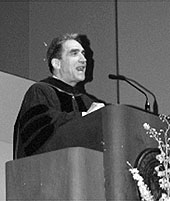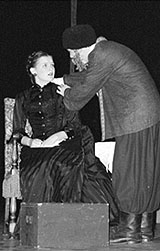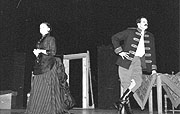By Courtney Roach staff reporter Learning and the arts are intertwined and embedded in the genes of humans, said Robert Pinsky, the 39th poet laureate of the United States at Honors Convocation Thursday."Art is not at the fringes of our intelligence ... but genetically embedded in our core," Pinsky said. His comments came as a surprise to some who expected to hear verses of poetry at Honors Convocation. Ryan Wood, a junior economics major, said he was impressed with Pinsky's speech. "It wasn't what I expected to hear him talk about, society, but it was very insightful," Wood said. Pinsky was introduced by Betsy Colquitt, emeritus professor of English, who is also a poet. She said the nice thing about the profession of a poet laureate is that it does not have much of a job description, but Pinsky has been unusually creative and imaginative with this position. "When he was given the title of 'poet laureate' by the Library of Congress, they couldn't have known how effectively he would use his position as an advocate and spokesman for poetry," Colquitt said. In 1998, he started the "Favorite Poem Project," which asked all Americans to submit to him their favorite poems. To date, he has received more than 18,000 poems.
Pinsky said he has shown these video clips on "The NewsHour with Jim Lehrer," where he is a regular guest. He said he has received a lot of feedback from people who felt emotion after connecting with a poem. "The medium for a poem, in my opinion, is not words, is not lines ... it is whatever comes between emotions and feelings of author and audience," Pinsky said. "It is that person's body." Pinsky began his speech with a detailed description of a "critter" who is not the fastest creature on earth, cannot swim the best, cannot climb the highest and cannot fly at all. He went on to reveal the "critter" is a human who, although it cannot accomplish these feats with the greatest of abilities, has developed poetry, art, dance and visual arts. He then asked audience members to picture a 14-year-old person of any race and either gender standing on a street corner. He then asked them to picture a musical instrument case in his or her hand. "Doesn't that make you smile?," he asked. He said he was trying to demonstrate the value and beauty of a student who is learning an art. Pinsky closed his speech by reading some examples from a book of America's favorite poems. He also read letters that he has received in response to the book and video showing. Honors Convocation was concluded with the presentation of the 2000 Honors Faculty Recognition Award to Bonnie Blackwell, assistant professor of English, and Richard Galvin, a professor of philosophy. Normally, the award is only presented to one professor. This year, two professors were deemed worthy, said Adrianne Anderson, chairwoman of the Student Honors Cabinet.
Courtney Roach
By Danny Horne staff reporter When classes start next fall, there might be more minority students on campus. Jim Atwood, assistant to the dean of admissions and a professor of religion, said, as of March 20, admission applications for minority freshmen were up 13 percent from last year. "We actually feel the number may be higher than that," Atwood said. "Typically, we get a number of applicants who don't check the ethnicity box or check more than one box. After the admissions process dies down a little, we will go back and look at the 'unknowns' and determine a more accurate number." To date, the admissions office has received 840 applications from prospective minority freshmen, Atwood said. That number is up from the 738 applications received by the same time last year. Atwood said the recent increase in minority freshmen applications may be due, in part, to some changes in the recruiting tactics of the admissions office. "I would never indict any one person for any problems, but we have made the necessary adjustments," Atwood said. "We have done more traveling to areas like South Texas, which is a place we don't typically go. We also made some small changes to our visiting schedule." Atwood said the Community Scholars Program, which provides funds for students who attend local high schools, has also been effective. Dean of Admissions Sandra Ware said outside of the few adjustments made to travel destinations and visiting schedules, she was not aware of any other problems. "If people think there are problems, then I am disappointed that we haven't done a better job at making the campus aware that we are out and about the community," Ware said. "We have definitely been doing better, so it's unfortunate that people aren't aware." Atwood and Ware both said Cornell Thomas, special assistant to the chancellor for diversity, deserves some of the credit for the increase in minority applications. "We have worked very closely with (Thomas)," Ware said. "He has raised the interest of the community in saying that (TCU) is committed to attracting diversity." Thomas said the increased number of minority freshmen applications is encouraging, but the important number will not come out until next fall. "We have to wait and see how many actually choose to attend TCU," Thomas said. "It's not an issue as to whether they will actually get admitted. We are talking about top-notch students who do have other options. As with any student, they make decisions about college based on a number of reasons, whether it be scholarship issues or wanting to stay closer to home." Ware said TCU is becoming better known in the community because of the efforts made at portraying the campus as more welcoming and comfortable. Darron Turner, director of Intercultural Education and Services, said making the students feel comfortable and welcome starts early. "(Prospective minority) students who come to tour the campus want to see people like them," Turner said. "It becomes a problem for them if they don't see anyone, and it can sway their decision."
Danny Horne
By Kathryn Garcia staff reporter The Second Annual Minority Leadership Banquet provides student leaders in the minority and international communities with something important, said Darron Turner, director of Intercultural Education and Services: the opportunity to be recognized."(The awards) are to acknowledge people for all their work done to benefit the minority and international communities: from faculty and staff members to advisers," Turner said. The banquet, sponsored by Intercultural Education and Services, begins at 6:30 p.m. today at the Ramada Plaza Hotel downtown and will be followed by a formal dance. The cost of attendance is $10 per person, but tickets are no longer being sold. Joe Machemehl, a junior religion and history major, said the banquet is a wonderful way to get diverse people together to share and celebrate their differences. "One of the worst things at TCU is its lack of diversity," he said. "(The banquet) gives people support and allows for an exchange because you have so many different groups coming together for one cause." Twelve awards - including the Faculty Appreciation, Distinguished Achievement Leadership and Organization awards - honoring students, faculty, staff, adviser leaders and organizations that have demonstrated leadership within the TCU and Fort Worth communities will be distributed by Chancellor Michael Ferrari and Turner following the dinner. Machemehl said it is an honor to be have been nominated for the Outstanding Leader Award. "I think one of the reasons I was chosen was because I'm an officer in (the Latino fraternity), and we've done a lot for the community this year," he said. "Our pledges cook food for the Food for Life. We've volunteered for College Bound and helped coordinate the (Mexican Independence Day) parade." Candice Watkins, a junior radio-TV-film major, said she is attending the banquet because she is a nominee for the Academic Achievement Award, and her sorority, Delta Sigma Theta, was also nominated for the Organization Award. "I think (the banquet) is a great idea," she said. "Not only will we be recognized for our achievements, but we'll also have fun with one another." Several officials said the formal dance provides a nice touch to the evening. Anisa Dhanani, Turner's assistant and a senior management and finance major, said the dance gives minority and international students not involved with Greek organizations a chance to attend a formal. "The majority of the minority population does not belong to Greek (organizations), and, normally, only frats and sororities hold formals," Dhanani said. Turner said the staff of the Office of Intercultural Education and Services wanted to help students that otherwise would not be able to attend a formal because of the high cost to do so. "The department stepped up to do something where financing would not prohibit somebody from going out and having a good time," he said. "Where else can you spend $10 and get a dinner and a formal?"
Kathryn Garcia
By Omar Villafranca staff reporter Sophomore theater-television major Michael Gauthier does not have stage fright, but he is scared of flying. But since the show must go on, he will spend 16 hours on a flight to Russia to be in a play sponsored by the TCU theater department.
The actors involved are preparing for cultural differences they will encounter, they said. Travis Willingham, a freshman theater major and actor in the play, said he is working to overcome the language barrier. "We've had a tutor for the (Russian language)," Willingham said. "I don't want to say something (incorrectly) and get myself in trouble in a foreign country. This Russian woman gives us voice lessons for about an hour. We repeat what she says over and over until we get it right." Kate DeMattos, a sophomore theater-television major and stage manager of the show, said she too is having some trouble getting over the language barrier. "I'm doing horrible with (Russian)," DeMattos said. "They have a totally different alphabet. I am impressed with (our) cast, though. They caught on pretty quickly." George Brown, an associate professor of theater, said the students are learning Russian to use in the play. "About a dozen lines of the play will be in Russian," Brown said. "Like some of the punchlines and jokes of the play." Forrest Newlin, chairman of the theater department, said the customs in Russian theater have differences that students will notice. "The Russian people are theatergoing people," Newlin said. "They're not into TV or movies. They love theater. They throw flowers after shows, ask for autographs and give bouquets." Willingham has spoken to other actors who have gone to Russia and has heard of the customs. "I hear there are certain customs that Russian audiences have," Willingham said. "Some clap in certain ways." DeMattos said she has also heard of the Russians' theater traditions, especially their generous applause.
Newlin said the Russians also have different acting methods. They incorporate more physical movement into their acting, he said. "They're very technique-oriented," Newlin said. "They don't need to have language. Their body action tells you a lot about what's going on." Shanna Riddle, a sophomore theater education major, said the actors are antsy but prepared. "We're always nervous about what an audience will think of the show," Riddle said. "It's their native author's show, and we want to do it justice. I think we'll do a good job."
Omar Villafranca |
| The TCU Daily Skiff © 1998, 1999 Credits |
 He has been traveling across the country letting people
read their favorite poems into his camera. From ditch diggers to social
workers, people of every age, race and gender have read poems for Pinsky.
He has been traveling across the country letting people
read their favorite poems into his camera. From ditch diggers to social
workers, people of every age, race and gender have read poems for Pinsky. Actors within the department will be performing Anton Chekhov's
play, "The Bear," in Togliatti, Russia, at the First International
Classic Russian Playwrights Festival on the Volga. The theater department
at TCU - which has an apprenticeship with a professional Russian theater
called Theatre Kolesko - is the only American university theater department
invited to the festival. Students will leave Thursday and return April
29.
Actors within the department will be performing Anton Chekhov's
play, "The Bear," in Togliatti, Russia, at the First International
Classic Russian Playwrights Festival on the Volga. The theater department
at TCU - which has an apprenticeship with a professional Russian theater
called Theatre Kolesko - is the only American university theater department
invited to the festival. Students will leave Thursday and return April
29. "I hear they constantly do a standing ovation,"
DeMattos said. "They don't want you to leave the stage."
"I hear they constantly do a standing ovation,"
DeMattos said. "They don't want you to leave the stage."